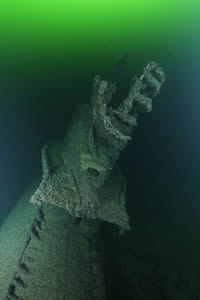Music Stage 3
Overview

Wreck of the Russian submarine Akula near Hiiumaa, Estonia
Students compose a soundscape using graphic or traditional notation in response to the images of underwater First World War wreckage.
Teaching and learning activities

Underwater sunshine
What sounds surround underwater war wreckage?
View the gallery of images of underwater First World War wreckage on the UNESCO website: Underwater Cultural Heritage—Centenary of World War I.
Look at the way new things grow out of the wrecks at these heritage sites.
Consider and discuss how these images combine water and war, growth from decay, and rebirth and recycling.
Think about what sounds could communicate your thoughts. Would they be long or short? Loud or soft? High or low? Many at once or just one or a few?
Compose a soundscape using graphic or traditional notation in response to the UNESCO gallery of images of First World War wreckage.
Learning concepts
These additional questions can be used for discussion or further investigations.
Challenge
What challenges are faced in protecting historic underwater war wreckage? What sights and sounds would underwater archaeologists see and hear?
Change
How does underwater war wreckage change over time?
Community
How is the preservation of underwater war wreckage important to the community?
Syllabus links
MUS3.2 Improvises, experiments, selects, combines and orders sound using musical concepts.
MUS3.3 Notates and discussed own work and the work of others.